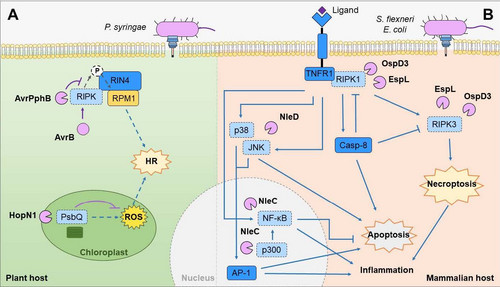Cutting the line: manipulation of plant immunity by bacterial type III effector proteases

Abstract
Pathogens and their hosts are engaged in an evolutionary arms race. Pathogen-derived effectors promote virulence by targeting components of a host’s innate immune system, while hosts have evolved proteins thatsense effectors and trigger a pathogen-specific immune response. Many bacterial effectors are translocated into host cells using type III secretion systems. Type III effector proteases irreversibly modify host proteins by cleavage of peptide bonds and areprevalent among both plant and animal bacterial pathogens. In plants, the study of model effector proteases has yielded important insights into the virulence mechanisms employed by pathogens to overcome their host’s immune response, as well as into the mechanisms deployed by their hosts to detect these effector proteases and counteract their effects. In recent years, the study of a larger number of effector proteases, across a wider range of pathogens, has yielded novel insights into their functions and recognition. One key limitation has remained the lack of methods to detect protease cleavage at the proteome-wide level. We review known substrates and mechanisms of plant pathogen type III effector proteases, compare their functions to those of known type III effector proteases of mammalian pathogens. Finally, we discuss approaches to uncover their function on a system-wide level.
Read this Review at Journal of Experimental Botany
